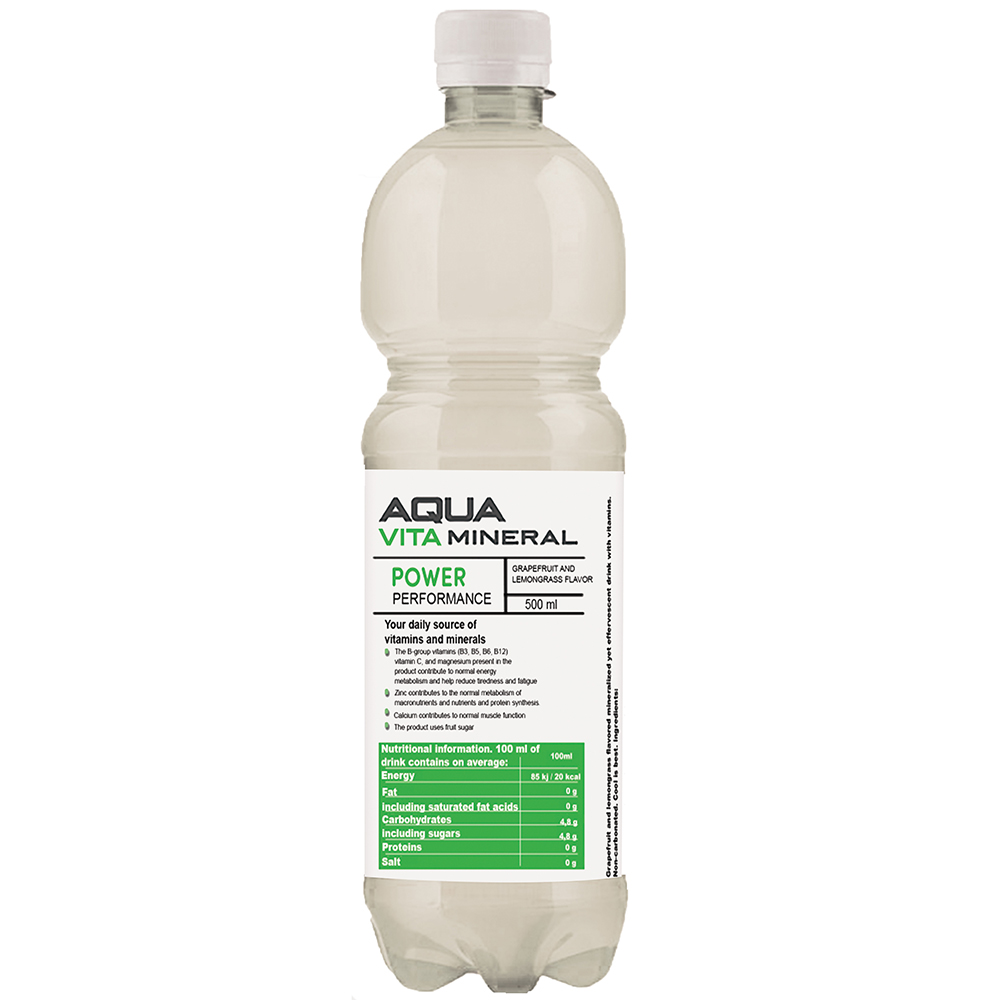Aqua Vitamineral Power
Aqua Vitamineral is a mineralized water-based drink with vitamins, the development of which has taken into
account the various needs of the human body. It's a great alternative to sugary soft drinks.
Power is a powerful vitamin drink. Like a soccer ball flying into the goal at full speed. In addition to
being useful, our vitamin drink also has a pleasantly refreshing taste of grapefruit and lemongrass.
The B group vitamins (B3, B5, B6, B12), vitamin C and magnesium contained in the product contribute to
normal energy metabolism and help reduce fatigue and exhaustion.
Zinc contributes to normal macronutrient and carbohydrate metabolism and protein synthesis.
Calcium contributes to normal muscle function.
The product uses fruit sugar.
Consuming a fortified drink does not replace a varied and balanced diet and a healthy lifestyle.
Your daily source of vitamins and minerals!
Ingredients
water; sugar; fructose (1.7%); acidity regulators - citric and malic acid; minerals (magnesium citrate,
calcium gluconate lactate, zinc sulfate, sodium selenate); vitamins (vitamins C, B6, B12, D, pantothenic
acid, biotin, niacin); natural lemongrass and natural grapefruit flavoring with other natural
flavorings; concentrates (from apple, molasses and hibiscus); stabilizers - E414, E445; preservative -
sodium benzoate.
| 100 ml of the product contains on average |
| Energy content85 kJ |
20 kcal |
| Fats |
0 g |
| of which saturated fatty acids |
0 g |
| Carbohydrates |
4.8 g |
| of which sugars |
4.8 g |
| Proteins |
0 g |
| Fibrs |
0 g |
| Salt |
0 g |
| Vitamins and mineral nutrients in 100 ml product |
| Niacin (B₃) |
1.7 mg |
| Pantothenic acid (B₅) |
0.6 mg |
| Vitamin B₆ |
0.2 mg |
| Biotin (B₇) |
6.7 μg |
| Vitamin B₁₂ |
0.3 μg |
| Vitamin C |
10.7 mg |
| Vitamin D |
0.3 μg |
| Magnesium |
50 mg |
| Calcium |
16 mg |
| Zinc |
1.3 mg |
| Selenium |
3.7 μg |
You can find here more information regarding the impact of these vitamins and minerals to your body.
Niacin is essential for converting the food we eat into energy. It is a
key component of two coenzymes, nicotinamide adenine dinucleotide (NAD) and nicotinamide adenine
dinucleotide phosphate (NADP), which play critical roles in various metabolic reactions,
particularly those involved in the breakdown of carbohydrates, fats, and proteins.
Pantothenic acid is a vital component of coenzyme A (CoA), which is
involved in numerous metabolic reactions. CoA is essential for the breakdown of carbohydrates, fats,
and proteins, helping convert them into energy that the body can use.
Vitamin B6 is involved in the metabolism of amino acids, which are the
building blocks of proteins. It helps convert amino acids into other important molecules that the
body needs for various functions.
Biotin is a coenzyme that plays a crucial role in various metabolic
reactions, particularly in the breakdown of carbohydrates, fats, and proteins. It helps convert
these macronutrients into energy that the body can use for various physiological processes.
Vitamin B12 is necessary for the production of red blood cells in the bone
marrow. Red blood cells are responsible for carrying oxygen from the lungs to all the cells in the
body. A deficiency in vitamin B12 can lead to a type of anemia called megaloblastic anemia,
characterized by larger, less mature red blood cells, resulting in fatigue and weakness.
Vitamin C is a powerful antioxidant, which means it helps protect cells
from damage caused by harmful molecules called free radicals. Antioxidants play a key role in
reducing oxidative stress and preventing chronic diseases.
One of the most well-known functions of vitamin D is its role in calcium
absorption. It helps the body absorb calcium from the intestines, which is crucial for maintaining
strong bones and teeth.
Magnesium is crucial for muscle contraction and relaxation. It helps
regulate the activity of muscles, including the heart muscle. A deficiency in magnesium can lead to
muscle cramps, spasms, and irregular heart rhythms.
Zinc plays a crucial role in the functioning of the immune system. It
helps in the production and activation of immune cells, making it important for the body's defense
against infections and illnesses.
Selenium is a crucial component of various antioxidant enzymes, such as
glutathione peroxidase. These enzymes help protect cells from oxidative damage caused by harmful
molecules known as free radicals. By neutralizing free radicals, selenium helps reduce the risk of
oxidative stress-related diseases and supports overall cellular health.
